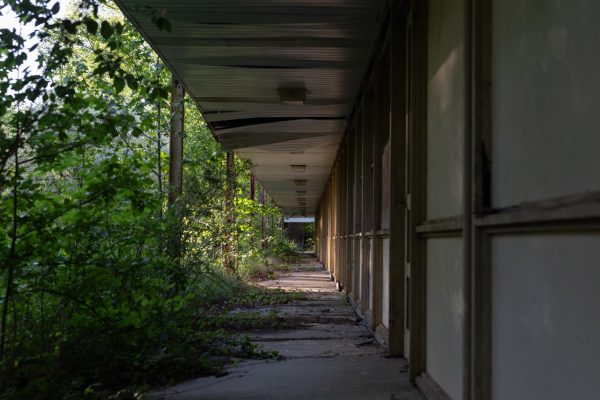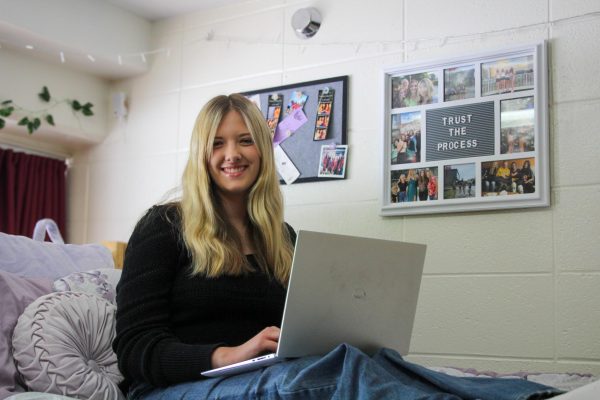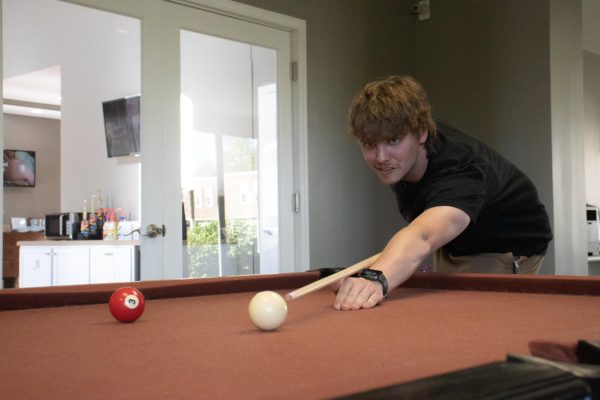The treasures of the Morris Library Archives
The Morris Library Archives are made up of various collections of documents from Southern Illinois University (SIU) scholars, politicians, foreign literature, and popular philosophy dating as far back as the 19th century.
University Archivist Matthew Gorzalski is in charge of the university’s records and takes care of most of the documents in the archives.
Gorzalski said the archive’s political collections consist mostly of politicians from the Southern Illinois area including former Senator Paul Simon, Rolan Burris, and former U.S representative Ken Gray.
Advertisement
The archives also have an extensive collection of American philosophy, Gorzalski said.
“We’ve got the papers of John Dewey and a handful of other philosophers. We have a lot of strong collections related to English and British 20th century literature,” Gorzalski said. “We [also] have a pretty good local history collection, mainly World War One or Civil War soldiers.”
Most things in the archives date back to around 1940 to the present day, but the oldest thing in the archives he can remember is a cuneiform tablet from Syria dating back to around 3500 B.C., Gorzalski said.
Most things in the archives are sourced from state laws that govern how they acquire records and how they’re expected to be managed, and most manuscripts are donated to them, Gorzalski said.
“Collections come in all kinds of all degrees of organization,” Gorzalski said. “A lot of times, especially with personal papers, or manuscripts […] you can get boxes of things that have no order at all.”
When it comes to unorganized collections that come in, Gorzalski said they might sit on shelves for years before someone is able to get to it.
“Once we do [go through them] then we go through the process of formally organizing it and then cataloging it which we call arrangement and description,” Gorzalski said. “That oftentimes involves some small measures of preservation for the materials, making sure they’re in proper housing, proper folders, [and] any kind of sleeves if that’s needed.”
Advertisement*
After organizing, they have to catalog the records, find their dates and find information about the creator of the record to have descriptions of what’s in the collections for a better understanding of what they consist of, Gorzalski said.
One thing Gorzalski and other archivists have been working on improving are their digital records which currently aren’t available to the public, he said.
“The digital records are far more likely to get lost or corrupted because of file format or software obsolescence,” Gorzalski said. “You may not be able to open anything, so that’s a big problem and we’re working on addressing that right now.”
The more fragile items in the archives like audiotapes and motion picture film are actually frozen with nitrogen-based preservatives to maintain their condition in an off-site storage freezer, Gorzalski said.
Gorzalski said people who usually request things from the archives are professors or scholars at various universities and graduate students that might need certain material for their courses.
“We also have public hours that people can just show up at and request to see items,” Gorzalski said. “We have a database online where you can at least discover what we have, [but] we have a lot of material that’s not even in the database yet.”
Gorzalski said one of the most popular things in the archives are papers from dancer Katherin Dunham, a popular Black dancer and choreographer in the 20th century.
When it comes to requesting things from the archives, questions are directed to research specialist Aaron Lisec.
“I do reference work to answer questions from people who write in or call in or come in, to use our collections or to ask about our collections,” Lisec said. “These are people, sometimes from all over the world, who are studying literature or history, whatever intersects with some of our collections.”
Something popular that is frequently requested is their Irish Literature collections, which get requests from scholars from the University of Dublin or Trinity College, Lisec said.
“We have a great collection of Irish writers, their letters, and manuscripts,” Lisec said. “We also have a really good collection of writers, mostly Americans although some British, who wrote between World War One and World War Two [during the] so-called Lost Generation.”
Lisec said he also posts things from the Archives on the Morris Library Facebook and Twitter to highlight certain collections.
There are also times where they’ll bring things out to the public to let the community see popular collections, Lisec said
“We had a celebration last month when it was the 100th anniversary of the publication of Ulysses, the novel by James Joyce,” Lisec said. “ The day that it was first published, they published 1000 copies and we have two of them. One of them was signed, and so we brought those out on February 2 to have people look at them.”
Associate Dean of Library affairs Anne Marie Hamilton-Brehm directs the activities of the Special Collections Research Center and usually approves of things that come into the archives.
“The thing about special collections that makes it different from a library [is that] libraries all try to have a collection of similar materials,” Hamilton-Brehm said. “In Special Collections, all we have are unique materials or very rare materials and so a lot of our collections, a lot of our materials, are found nowhere else in the world.”
Hamilton-Brehm said she has full trust in her archivist and their knowledge in their fields and usually never turns down suggestions for collections.
One of the Archive’s main interests is anything to deal with the History of Southern Illinois, Hamilton Brehm said.
“Sometimes people have had a long history with the university […] so they’re willing to donate their collections, correspondence, papers, and records that talk about what life at the university was like back in the old days,” Hamilton-Brehm said.
Hamilton-Brehm said it’s important to get the story of everyone with a connection to Southern Illinois and not just well-known people from the area. She feels that there are many people left out of the history of Southern Illinois, especially African Americans, she said.
“Walter Ray [the Political Papers Archivist], is collaborating with this group called Reclaiming the African-American heritage of Southern Illinois Project,” Hamilton-Brehm said. “They are actively seeking donations of historical materials from the African-American community in this area and more widely around Southern Illinois.”
In the future, Hamilton-Brehm said she hopes the Archives can acquire more things that tell hidden stories within the community so people can feel more attached to their past.
“We’re open to the public from Monday to Thursday, noon to four,” Hamilton-Brehm said. “I encourage everyone to come visit us and learn about their history because the history that we have in Special Collections belongs to everyone.”
Staff reporter Jamilah Lewis can be reached at [email protected] or on Twitter @jamilahlewis. To stay up to date with all your southern Illinois news, follow the Daily Egyptian on Facebook and Twitter.
Advertisement








